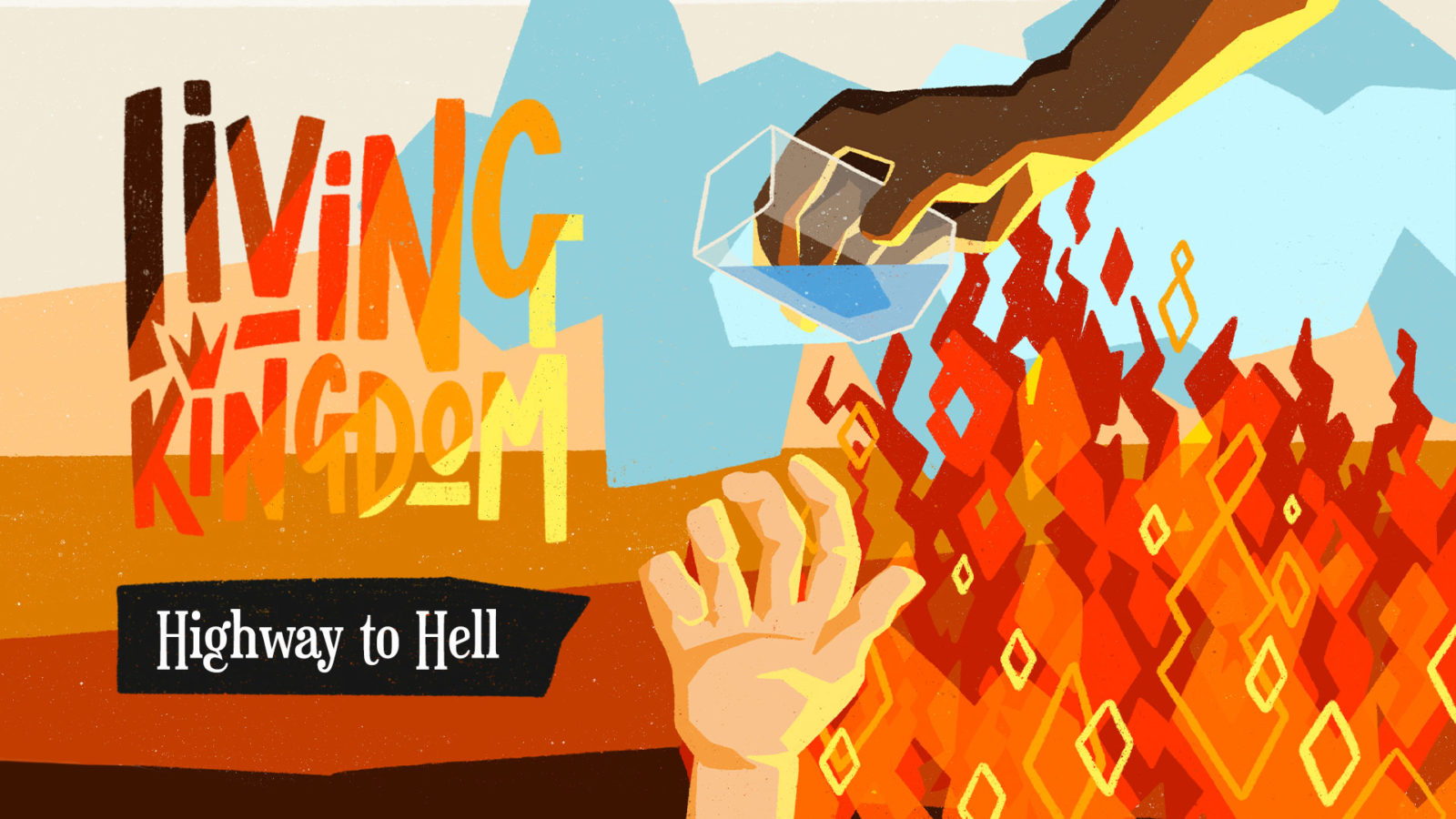Parable: The Rich Man and Lazarus
“He said to him, ‘If they do not listen to Moses and the Prophets, they will not be convinced even if someone rises from the dead’” (Luke 16:31).
At first glance, the story of the Rich Man and Lazarus (Luke 16:19-31) appears to be definitive evidence for an immediate arrival in the afterlife following death, either in heaven or an eternal hell. Lazarus, the seeming hero, resides in paradise, “Abraham’s bosom”, and the Rich Man, the apparent adversary, is tormented in Hades.
Luke 16:19-31 is a contentious passage. It appears to directly contradict the Adventist view of the afterlife. Contrastingly, many Christians see this story as a confirmation of their understanding of the afterlife. Although it is not explicitly stated that this story is a parable, it is implied in the surrounding text. It is a part of a trilogy of parables (Luke 15:11-16:31) exploring the relationship between serving God and serving money.
When interpreting parables, it is vital to read discerningly as “figurative expressions and narratives” must “be understood in terms of the literal statements of scripture concerning the truths referred to”.1 Jesus uses language and images familiar to His audience to explain His upside-down kingdom. In Jewish thought, the image of Abraham residing in Paradise and of Hades and Paradise communicating with each other were common idealisations of the afterlife. Jesus was meeting His audience where they were at to explain kingdom concepts.2 The conception of the afterlife in this passage is not intended to be a source of doctrine.3
The parable of the Rich Man and Lazarus cannot be passed over despite the temptation. Jesus places an immense value on those who society despises. The position that you hold on this earth is not an indication of the size of your mansion in heaven!
At the centre of the story is a massive humbling; one with eternal ramifications. It is a continuation of Luke’s “reversal” motif which has more than “50 references in Luke-Acts”, in which the powerless become powerful.4 Rather than a literal recount of what the afterlife is like, this story is an exploration of the divine inclination towards “social justice”, what social justice should look like in the life of the believer, and how the way that we treat others in this life informs our treatment in the next.5
The story begins with the Rich Man whose only problem was likely the beggar at his gate, Lazarus. These two would have likely crossed paths multiple times per day, Lazarus, growing sicklier by the moment, and the Rich Man, not seeing or perhaps just not caring. The Rich Man would walk by dressed in his finery, no doubt caught up in the excess and feasts of the upper class and far too busy for the likes of the beggar.6
Death subverts these roles. The Rich Man begs for a drink in Hades, and Lazarus, residing in paradise, is unable to help. The reason given for Lazarus’ inability to help is provided by Abraham, who says, “in your lifetime you received your good things, while Lazarus received bad things, but now he is comforted here and you are in agony” (v25). The fates of the men in life have been reversed in death. When the Rich Man asks that Lazarus be able to tell his family about what is to come so that they can remedy their actions, Abraham says that they already have all the information in “Moses and the Prophets” (v29).
The concept of reversal is interwoven throughout the passage, even down to the naming of the characters. The poor beggar receives a name and in doing so becomes the only named character in any of Jesus’ parables. In contrast, the Rich Man is unnamed and is characterised only by his wealth, which is confronting to say the least.7 Lazarus’ name speaks to the hope that our heavenly Father sees those who society does not. This story teaches that our heavenly Father sees the plight of all people. Even Lazarus’ name, which is a derivative of the Hebrew name Eleazar meaning “God heals”,8 communicates God’s care for the downtrodden. Lazarus is so destitute that he must be utterly reliant on God.
The idea of the Rich Man receiving his comeuppance in death because he experienced prosperity in life is a somewhat disturbing image. The implication seems to be that our fortunes in the afterlife are linked to our lots on earth. If so, are the wealthy inevitably dammed? Does Jesus hate the rich?
The reference to Moses and the Prophets indicates that wealth is not the problem. The cause of the Rich Man’s suffering is rather implied to be the way he used his wealth. Abraham says that the works of Moses and the Prophets are enough for entry into paradise. The Books of Moses—Genesis through to Deuteronomy—provide several guidelines for living, many of which are concerned with the treatment of those deemed lesser in society, especially orphans and widows. For example, at the end of every third year, part of the tithe was allotted for the “sojourner” and the “fatherless and the widow” (Deuteronomy 14:28,29). The Deuterocanonical laws called people to love radically. If the law was kept properly it would have created a society in which no Israelite went hungry. Moses and the Prophets are all about the way to treat others. And yet, even though this theme runs throughout the Old Testament, the spirit behind this law was not kept. Moses and the Prophets serve as a call to the reader to see their neighbour and to work for their good now.
Our worldly status does not matter in the kingdom of God. Our new car is nothing in the kingdom of God. Our new clothes are filthy rags in the kingdom of God. Even the tithes and offering we return are nothing in comparison to the kingdom of God. God sees. God sees the rich man and the poor man. He weeps when the poor man is passed by—by the person who is rich according to the world but poor in spirit. He triumphs when the man who is perceived by the world as rich counts himself poor when he is not spending time connecting with God and completing the work of restoration set out before him.
How many times do I, like the Rich Man, walk past those with need without even seeing them? Countless I am sure. But even worse is that sometimes I do see. I see someone who I know I could help if I took a moment, but I falter for a second, think about how much I really need to get done that day and then keep walking. This parable is a challenge; and a warning. It is time to see others the way that Jesus sees them—as His beloved creations—and then to start treating them like that. We must stop and look at who is at our gate.
There are also times when I feel like a Lazarus. As though I am barely holding on and that even though I am calling out, begging and pleading for help, nobody is hearing me. Or worse, if they do, they are choosing not to listen. Despite it all, God remains our comfort, but it would be nice to know that someone sees. When I am seen everything changes. When somebody notices my suffering and chooses to walk beside me, it means the absolute world. What you do for others, especially those who are overlooked by all on the pavement, matters.
We need to put our God-glasses on; we must see ourselves and others the way that Jesus sees us, and in doing so, start viewing things through the lens of the kingdom. No matter what position we find ourselves in life, we are called to realise that God sees us, that He sees others, and that we are to carry out the work of restoration laid out in the Old Testament and exemplified by Jesus’ ministry.
So often I find myself living according to my priorities, chasing after what I want and doing what is best for me. I forget that Christ-followers are called to be intensely aware of the needs of others. The parable of the Rich Man and Lazarus tells us that it is time to get our glasses cleaned and to see people the way Jesus sees them. We need to get used to advocating and seeking justice for others. If we believe in Jesus and want to be a part of His upside-down kingdom, then we need to move away from what this world values and allow Jesus to transform our minds so that we see with a kingdom lens (Romans 12:2).
Kira-leigh Josey is final year theology student at Avondale University College, completing her placement at Avondale Memorial Church.







